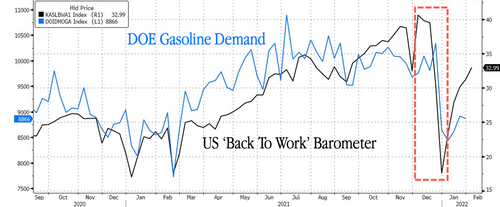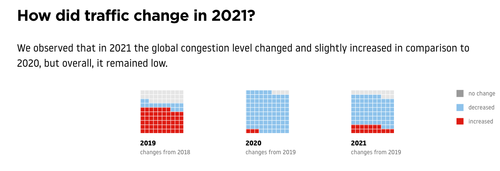This was going to happen and in the face of powerful institutional resistence. Instead COV 19 swept away all resistence and everybody got on board overnight.
The reality is that a trained knowledge employee can get his work product out at home and email it to others. There can be zero need to ever commute.
Better yet you can immediately upgrade your living conditions by exiting that $1,000,000 downtown condo and moving to a distant acerage far away. Maybe even back to where you grew up. All those suburbs are today prospering with plenty of new buyers.
This happens to be the main unintended consequence of this pandemic.
Global Traffic Sputters Below Pre-Virus Levels As Remote Work Reformats Society
BY TYLER DURDEN
FRIDAY, FEB 11, 2022 - 02:45 AM
https://www.zerohedge.com/markets/global-traffic-sputters-below-pre-virus-levels-remote-work-reformats-society
The proliferation of high-frequency data, otherwise known as real-time, has brought more comprehensive economic data analysis to understanding mobility trends, thus a proxy for economic recovery during the pandemic.
Location tracking company TomTom reports traffic congestion worldwide has declined two years after the virus pandemic began, as mobility trends for 2021 were 10% lower than in 2019. Slumping traffic data provides powerful insights into how remote working has impacted driving patterns as more white-collar workers stay home than commute.
TomTom monitored congestion levels of 70 major metro areas worldwide and found that traffic patterns are not back to normal. This comes as more companies authorize permanent remote or hybrid work schedules.
However, there's a dark side to lower congestion levels, impacting metro areas the hardest. For example, building security company Kastle Systems, able to track employees in the office via key fobs or smartphone-based digital keys, has shown a dismal recovery of workers returning to the office in New York City. Omicron made matters worse in late 2021, as only 25% of workers were back in the office. With more workers at home, congestion and foot traffic declined. Those folks spend less money on fuel, eating out, and other expenses associated with commuting and working in metro areas -- leading to a slower economic recovery in metro areas.
Slumping congestion resulted in the potential decline in gasoline demand in late 2021 and extending into the new year. To show this, we overlay Kastle Systems data of US "Back to Work" barometer and gasoline demand, only to find a strong correlation between the two.
Flexible and creative work arrangements will forever change the concept of work for white-collar workers and spell disaster for commercial building operators who see companies downsizing their footprints.


No comments:
Post a Comment